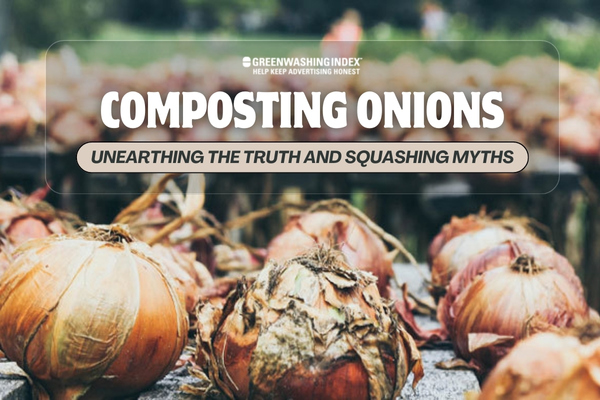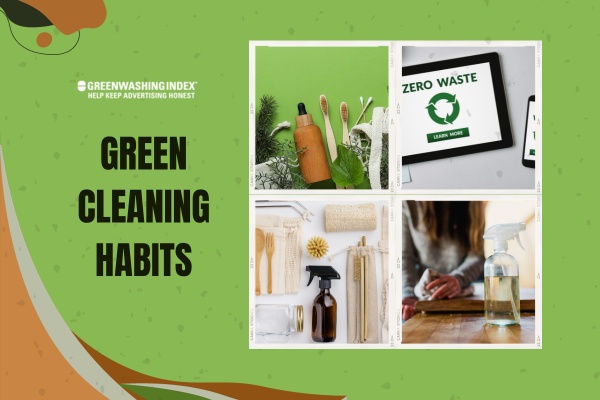Onion peels dance along with the gust of a chilly evening wind as they make their way to the compost bin – this image may be all too familiar if you’re one who’s keen on sustainable living. But then, are you doing right by your compost heap?
This is where our focus on composting onions comes into play. Questions tumble over one another as you wonder aloud, “Should onions even go into the compost pile? Are there risks involved?”
Yes, contrary to some popular beliefs, you definitely can include those onion layers in your backyard compost bin. Albeit possessing a unique set of properties compared to other vegetable waste, onions are fully capable of breaking down and contributing to wonderful, nutrient-rich soil enhancement.
You’re Just One Scroll Away From:
- Unfolding the mystery surrounding onion’s role in sustainable composting.
- Understanding why or why not onions pose a problem for organic waste management.
- Discussing expert opinions highlighting both sides of the onion-compost debate.
- Sharing experiences from seasoned gardeners about composting onions – their triumphs and letdowns.
- Practical guidance on how to safely incorporate your onion waste into the pile without hassle.
All About Composting
Composting is a natural process that transforms your kitchen waste and yard clippings into a nutrient-rich soil conditioner loved by plants everywhere. Composting isn’t just good for the environment – it’s easy, practical, and cost-effective.
How Composting Works?
Composting is nature’s way of recycling decomposable materials like fruit peels, vegetable scraps, coffee grounds, leaves, grass clippings, and even certain paper products. These materials compost because they are primarily made up of organic matter, which bacteria can consume.
- The composting process begins with green and brown materials. Green materials provide the nitrogen necessary for composting, while brown contribute carbon. It’s important to add both types in a balanced manner.
- Adding water helps break down these elements at a faster rate through microbial activity within the pile.
- The heat built up inside breaks down the organic material, further turning
it into nutrient-rich compost over time.
It’s interesting to note that while most kitchen waste is great for composting, onions always stir up some controversy in the compost world. Can you actually compost onions? We’ll delve deeper into this latter pressing question as we proceed with this article!
The Importance of Compost in Gardening
Did you know that adding fresh layers of compost to your garden can make your plants healthier and more productive? Here’s why:
- Nutrient Supply: It provides an abundance of nutrients to feed your plants.
- Soil Structure: Compost promotes better soil structure, making it easier for plant roots to grow.
- Moisture Retention: It helps soil retain moisture, reducing water runoff, especially during summer months, which is essential for thriving gardens.
- Disease Resistance: Healthy soils propagated by good quality compost can help fight off plant diseases.
Once you’ve gotten started on sustainable practices such as composting, it’s hard to stop. A question that often arises for eco-conscious gardeners is specific to composting onions. Keep reading to find out why this topic is subject to so much debate.
Recognizing Onions’ Role in Composting
Onions, like other types of organic waste, hold significant value in our journey towards sustainable composting. Understanding their role and how they contribute to the system will allow you to optimize your compost heap effectively.
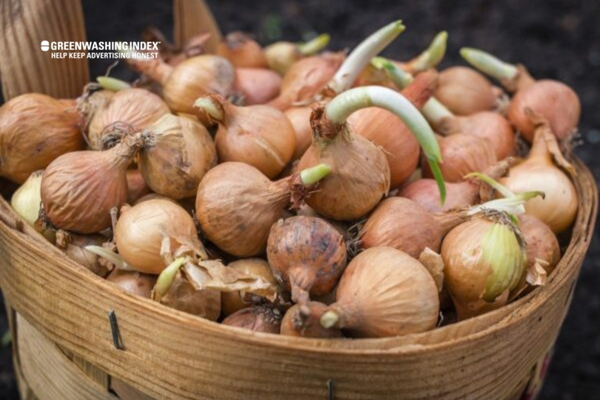
What Makes Onions Different?
Onions, I’ve learned, are unique in comparison with other vegetables. Their distinct characteristics can affect their decomposing process as well as the composition of the resulting compost. Here’s what I found:
- Pungent Smell: Unlike many veggies you’d toss into a compost pile, onions have a strong and distinctive odor that makes them stand out. This is primarily due to sulfur compounds found within onions.
- Higher Acidic Content: Onions have a higher acidity level compared to most vegetables. The acidic nature can affect the pH balance of your compost heap when added excessively.
- Resistance To Decomposition: The dry and papery outer peel of an onion acts as a natural barrier that slows down its decomposition process compared to other compostable kitchen scraps.
Remember, while these don’t necessarily disqualify onions from being compost material, they do impose certain conditions on how onions should be treated prior to being added for optimal results.
Pros and Cons of Composting Onions
Composting onions isn’t all doom and gloom – it carries its own set of benefits along with possible downsides. Let’s take an in-depth look:
Pro: Trace Minerals
Onion skins are rich in trace minerals like sulfur, which aids plant growth when incorporated into garden soil through organic waste management methods such as composting.
Pro: Disease Control
Interestingly enough, some studies suggest that onion peels may have anti-fungal properties that help curb certain diseases common among backyard compositors.
Con: Attract Pests
As mentioned earlier, the smell emitted from rotting onions could potentially attract unwelcome visitors to your compost heap, such as insects or rodents.
Con: Risk of Acidification
The high acidic content in onions might affect the soil’s pH negatively if not balanced with other green and brown compost ingredients.
Needless to say, the onion compost debate doesn’t revolve entirely around whether they can be composted or not – but rather, how it should be done to maximize benefits and minimize downsides. Appropriate onion waste disposal techniques within a compost heap will play a deciding role here.
Can You Really Compost Onions? Settling the Debate
Digging into the crux of our subject, let’s discuss whether composting onions is actually viable or not. This rampant onion compost debate has stirred many eco-friendly gardening enthusiasts and professional gardeners alike. Stay with me as we delve into expert opinions and my personal experiences on this intriguing subject.
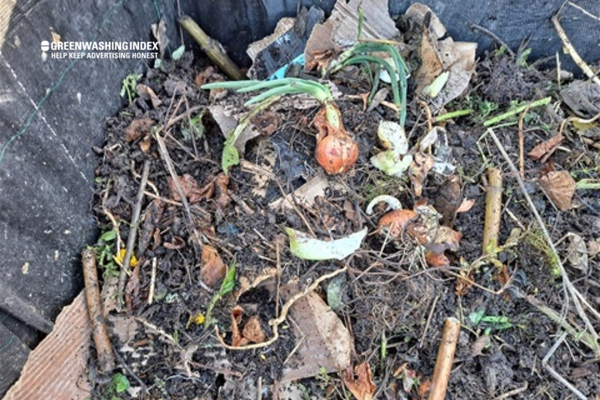
Expert Opinion on Onion Composting
In my quest for a final verdict on recycling onion peels in compost, I stumbled upon various expert viewpoints and studies:
- Oregon State University’s Master Gardeners Program insists that onions are completely compostable, just like other kitchen scraps. Their logic suggests that given appropriate conditions such as moisture, oxygen levels, and ambient temperature – onions will decompose effectively.
- The U.S. Environmental Protection Agency (EPA) also classifies onions under the acceptable category for composting organic waste materials.
- However, some gardening experts express caution regarding adding onion waste to your compost pile as they might attract critters due to their strong odor and could potentially slow down the process of decomposition if chucked in large amounts.
Exploring these diverse opinions, it’s evident that while onions are indeed compostable, their inclusion in your pile should be measured.
My Personal Experience with Onion Composting
Having been invested in sustainable composting for years now has given me an edge in understanding this topic. Let me share my unique experience with composting onions that could shape your decision about this organic waste management:
- I started adding small amounts of onion peels to my active heap regularly.
- Initially, I discerned some slowdown in decomposition compared to other kitchen scraps.
- However, I did notice animals getting attracted by the smell if not covered adequately.
- Continued adherence to turning my pile frequently and ensuring proper aeration helped speed up the process.
- I ensured peels were cured outdoors for a day or two before incorporation. The reduced smell not only made it less attractive to pests but surprisingly also resulted in better decomposition.
Composting onions isn’t a hard no. It’s about the quantity, preparation, and maintenance of your compost pile that determines success. Conduct this eco-friendly gardening practice wisely by maintaining the right balance in your organic waste management pursuits. Next, we’ll discuss how to safely incorporate onions into your compost heap while avoiding potential pitfalls. Stay tuned!
Procedures for Effectively Incorporating Onions into Your Compost Heap
Digging deep into the layers of onion composting, it proves necessary to understand how to appropriately enrich your compost heap. Here are some exclusive insights and potential pitfalls to be aware of before joining this sustainable living adventure.
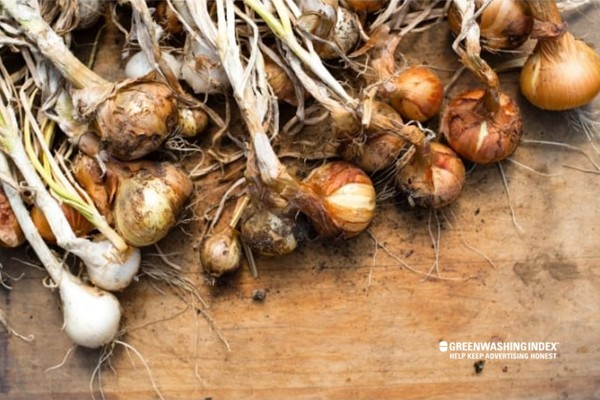
Detailed Instructions for Safely Adding Onions to Your Pile
Adding onions to your compost pile begins with understanding a few essential steps.
- Select the Type of Onion: Green onions and scallion tops are typically more compost-friendly than full-grown onion bulbs or skins because they decompose quicker due to their higher moisture content.
- Chop it Up: Before you toss them in the bin, break down onions into smaller pieces. A little extra effort can speed up the decomposing process later, enhancing your overall organic waste management.
- Layer It Right: Try adding onions as part of a mixed layer with other green waste products like grass cuttings or vegetable peelings, reducing the impact of their high nitrogen content.
- Turn Your Pile Regularly: This allows oxygenation which aids in faster composting while also helping disperse any strong smells that might attract pests.
Remember, proper preparation ensures efficient decomposition making a rich, nutrient-filled nourishment that results in best eco-friendly gardening practices.
Potential Pitfalls to Avoid When Adding Onions to Your Pile
With an insight shared on recycling onion peels and using them for composting, let’s look at certain roadblocks one might encounter along the way:
- Potent Smell: The strong aroma can invite pests like rats or raccoons.
- Attracts Flies: Certain types of flies are drawn particularly by decomposing onions.
- Slow Decomposition: Heavier parts like skins may take longer time becoming undesirable elements in a finished compost pile.
- Balancing PH Levels: Onion peels can slightly acidify compost, making it essential to balance it out.
Evidently, these obstacles don’t represent a shut gate to composting onions. In fact, they serve as signposts guiding towards safer onion waste disposal and mastering this sustainable practice. If managed correctly, onions can be composted just fine and present a more eco-friendly method of organic kitchen scrap management than simply tossing them into the bin.
FAQs
Why are there mixed opinions regarding onion composting?
The composting onions debate is due in part to their strong scent, which may attract pests and the belief that their acidity can harm beneficial microbes. However, others argue that these factors don’t have a significant negative impact on the compost pile.
Are there certain types of onions that are better/worse for my compost heap?
Generally, all types of onions can be added to your compost heap. However, it’s crucial to bear in mind that onions with thicker layers might take longer to decompose compared to those with thinner skins.
What are some signs that the onions aren’t breaking down properly in my pile?
If you notice an overly strong smell or see large chunks of onion even after several weeks of composting, these could be signs that they aren’t breaking down as effectively as they should be.
Can adding too many onions negatively impact my overall soil health?
Overloading your pile with too many onions can create an imbalance which may slow down the decomposition process. Moderation is key when it comes to incorporating different types of organic waste materials into your compost heap.
Conclusion
The onion composting debate, it seems, rests heavily on personal and expert experiences. From my perspective, composting onions can provide a valuable addition to your compost heap if done correctly. However, caution should be implemented when deciding where these kitchen scraps land in order to maintain a healthy and balanced organic waste management system for your garden.
Key Takeaway Points
- Onions can enhance the nutrient content of compost due to their high sulfur content.
- Ensure you’re adding onions to a well-mixed, diverse compost pile to prevent any potential issues.
- Seek advice from seasoned gardeners or professionals about potentially incorporating onions into your compost routine.

